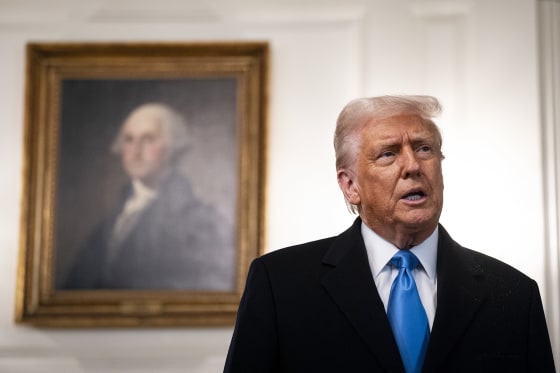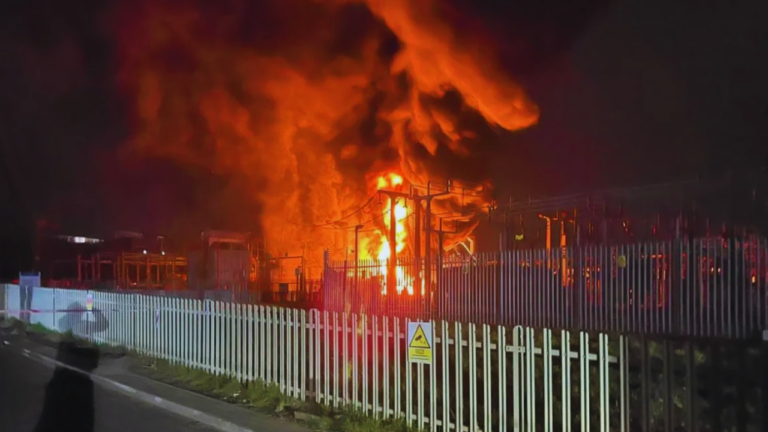
nbc news via Lynne Sladky / AP
A judge ordered the administration last week to keep sending foreign aid after Trump stopped almost all U.S. foreign assistance.

A federal judge ruled Thursday that the Donald Trump administration has not fully complied with a court order that paused the freezing of foreign aid grants and contracts.
The case revolves around an executive order signed by President Donald Trump, which paused nearly all U.S. foreign assistance. This move led to claims from federal contractors who challenged the order, arguing that it harmed their businesses and disrupted their contracts.
Last week, U.S. District Judge Amir Ali ruled in favor of these contractors, ordering the administration to continue disbursing foreign aid. The judge found that a blanket suspension of foreign aid, as instructed by Trump’s executive order, caused significant harm to the contractors and was likely unlawful under the Administrative Procedure Act, which governs federal agency actions.
The Trump administration had implemented this suspension after Donald Trump signed an executive order on his second inauguration day, halting all foreign development assistance funding for 90 days. The order directed all federal departments and agencies to pause new obligations and disbursements of aid to foreign countries and nongovernmental organizations. Secretary of State Marco Rubio, shortly after being confirmed, issued an immediate halt on nearly all foreign assistance managed through the State Department and USAID (U.S. Agency for International Development).
The judge’s ruling came after the administration’s attempt to show that the State Department and USAID had reviewed the canceled contracts and grants, arguing that nearly all of them were in line with the terms of the contracts.
However, this was not enough to satisfy Judge Ali’s concerns. He emphasized that the blanket suspension of foreign aid continued to harm contractors, and it was likely that such a broad suspension was not allowed under U.S. law. The judge’s language made it clear that he felt the Trump administration had been seeking ways to justify its actions after the court’s initial ruling, rather than immediately complying with the order to stop the aid freeze.
Ali wrote in his ruling that the administration’s actions indicated a lack of full compliance with his earlier court order. He stated, “By enjoining Defendants and their agents from implementing any directives to undertake such blanket suspension, the Court was not inviting Defendants to continue the suspension while they reviewed contracts and legal authorities to come up with a new, post-hoc rationalization for the en masse suspension.” This suggests that the judge felt the administration was trying to find new legal justifications for continuing the aid freeze, despite the court’s previous ruling.
The judge also pointed out that the Trump administration had not yet provided evidence to show that its suspension of foreign aid would not cause irreparable harm to the contractors. Furthermore, the administration had not fully considered the implications of the aid freeze on the interests that depend on the funds.
Judge Ali stated, “The Court stands prepared to consider such arguments and evidence at the preliminary injunction stage,” meaning that the administration had the opportunity to present evidence to defend its actions. However, until the government can show that the suspension was justified, the court ordered it to immediately cease the blanket aid freeze.
Despite ruling that the administration was not complying with the court order, the judge stopped short of holding the Donald Trump administration in contempt. Instead, he ordered an immediate halt to the foreign aid freeze and allowed the case to continue moving forward.
This is not the first instance of the Trump administration being found in violation of a court order during his second term. Earlier this month, a federal judge in Rhode Island ruled that the administration had violated his order halting a broad federal funding freeze, which included foreign aid, but also affected domestic grants and loans. The memo that had enacted the funding freeze was rescinded in late January, but the ruling in Rhode Island still stands as an example of the administration’s ongoing legal challenges over its handling of funding suspensions.
In response to the ruling, a White House spokesperson did not immediately provide any comment. The lack of a response from the White House signals that the administration may be considering how to proceed in light of the judge’s decision. It’s unclear whether the administration will take further action or appeal the decision.
This case is significant as it highlights the ongoing tension between the executive branch’s actions and the judiciary’s oversight.
The courts have played a key role in checking executive power, ensuring that the administration’s decisions comply with constitutional and statutory laws. The ongoing dispute over foreign aid underscores the delicate balance between executive authority and the judicial system, particularly in areas related to foreign policy and government spending.
In summary, the Trump administration has not fully complied with the court’s order to stop the freeze on foreign aid, as a federal judge ruled this week. The administration attempted to justify its actions, but the judge found that it was still violating the court’s ruling, which requires the immediate resumption of foreign assistance. The case continues to raise questions about the limits of executive power and the role of the courts in overseeing such decisions.
- Turn Your First $1K Baseball Hustle Cash Into Wealth - August 4, 2025
- $10K/Month Baseball Academy? Setup & Revenue Blueprint - August 1, 2025
- Baseball Data Jobs Are Booming — Heres What They Pay - July 30, 2025







